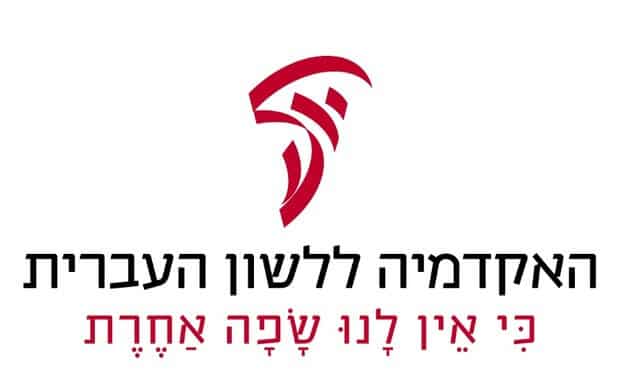How is it that: the Hebrew Language Academy does not have a Hebrew name? The angry D asks about the decrees of this institution

Behind the claim stands an implicit assumption regarding the existence of pure Hebrew words whose belonging to the language exceeds that of their immigrant counterparts. The truth, in the way of truths, is more complicated. It is difficult to find words that can be proven to have been born from Hebrew, the Bible infests words from Aramaic, Egyptian, Akkadian and even Greek with a density not less than the density of English phrases in the presentations of hi-tech companies. The very idea of a pure language, that is, of an original core from which the shell of foreign influences can be separated, is questionable. Languages are always created on the basis of previous languages and a natural language does not have a founding date by which it can be determined which is an original word.
Sages did not hesitate to put foreign words in the mouths of the ancient Israelites. Thus, according to the Midrash, Naomi and Ruth combined Greek words in their conversation, "There is no way for the daughters of Israel to go to theaters and circuses." According to Rabbi Nehemiah in "Yalkot Shimoni" God himself does not hesitate to use the Egyptian word "selfish" as the first word in the Ten Commandments.
The idea of the original language being contaminated by external influences was born in Europe at a time when the national movements flourished who wrote a "national" history for the Germans, Russians, French and other peoples in which the people are descendants of common ancestors and have a distinct national character. The philosopher Johann Fichte, one of the fathers of German nationalism, argued that only the original German language, free from the foreign influences of the Latin languages, would allow the German people to express the original culture, thought and values of their ancestors. About one hundred and fifty years later, the Nazis adopted the idea and tried to "cleanse" the German language of foreign influences. Among the many words that express leadership and rule, Hitler chose the nickname for himself Leader Because the origin of the word is considered pure German. It goes without saying that today there is no serious historian who would claim that a "pure language" exists or has ever existed.

And what about the Hebrewness of the words "language" and "Hebrew"?
The Hebrew Language Academy actually has a Hebrew name: its name consists of three kosher words in the Hebrew language that are all "foreign" to one degree or another. One of them is "Academy" common to Hebrew and most languages of the world. The second word "tongue" is common to Hebrew, to other Semitic languages such as the Arabic لِسَان "Lisan" and even the Maltese language (lsien), the equivalent word in Aramaic has been preserved in phrases favored by lawyers such as "Kahai Lishna" = in this tongue. From Arabic, the language also passed to Persian, which is an Indo-European language, and to Turkish, which means that it is quite an international word.
And what about the word "Hebrew"? In the Bible, the language of the Jews is referred to as "Jewish", for example Nehemiah complains that the Jews do not instill their language in the younger generation "and among them, half of them speak Ashdod, and they do not know, to speak Yiddish". The epithet "Hebrew" appears when a Jew introduces himself to foreigners, such as Joseph who presents his origin to Pharaoh "a stolen thief, from the land of the Hebrews" and like him Jonah who reveals his identity to the sailors on the ship with the words "Hebrews Onaki" or as the nicknames of the Jews in the mouth of foreigners as Pharaoh's daughter identifies Moses "My children" The Hebrews this". A common hypothesis is that "Hebrew" originates from the word "Habiru" which was used by the rulers of the great empires of Mesopotamia and Egypt to describe semi-nomadic tribes that penetrated their territories from time to time. That is, of the three words that make up the name of the institution, perhaps it is the Hebrewness of the word "Hebrew" that may be questionable.
Academy: Greek name of a non-Greek hero
But those who complain about the academy do so precisely because of the first word in its name "academy". Academy originated in Greek, but unlike other Greek words such as corridor, or Sanhedrin, it was also adopted into other European languages, therefore Academy sounds more foreign than "lounge", "sandal" or "Afikomen". The original academy was a school founded by Plato, the school received the name of the Athenian suburb where it was located and the origin of the name of the place is the name of the mythological hero Academos but the name of Academos itself has no meaning in the Greek language. When Plato (on behalf of Socrates) sails in the praises of Athens (in the dialogue "Mechsenus") it becomes clear that Academus is not Greek at all. "We (the Athenians) are pure Greeks and we did not interfere with foreigners. Because our citizens do not include the descendants of Academus or of Aegyptus or of many others who by their nature are aliens...". Well if Academicus is not Greek where did it come from? Probably from the mythological figure Cadmus: the one who killed a monstrous dragon with his spear and founded the city of Thebes. Cadmus was the son of Agnor, king of the city of Tire - the northern neighbor of our Naharia. The root KDM has no meaning in Greek, but in the area of the legendary origin of Cadmus there is and is. "Cadmus" is the one who came from "Kedem", that is, from the eastern shores of the Mediterranean Sea. If this is the case, then "Academy" is perhaps the most Hebrew (or at least Semitic) element in the name of this institution. If all this did not convince you, take comfort in the fact that the name of the most important cultural institution in France is the "French Academy" L'Académie française and although Greek is foreign to French just as it is foreign to Hebrew, most French people live in peace with the name of their academy.
Grammar is more important than word origin
But: if there is nothing wrong with borrowing words from other languages, why do we even need an institution to renew them in Hebrew? Language is not a storehouse of words but also and especially the way in which words are integrated in speaking and writing and receive different inflections. As a noun, software could be used instead of the word "software" that the academy renewed, but it is impossible to create from software the profession of programmer, the act of programming and the declension of the verb (to program, to program...). The word "academy" is of Greek origin, but it takes on the burden of Hebrew grammar when it creates the words "academic" or "academic".
Did an interesting, intriguing, strange, delusional or funny question occur to you? sent to ysorek@gmail.com
More of the topic in Hayadan:
- Uranus is from today Oron and Neptune from now on Rahab
- The Hebrew Language Academy approved a list of terms in public health research
- Discovery: The Semitic text is deciphered, probably the earliest ever discovered
- Words and more words: on the surprising history of technological terms
- The language instinct - the Bedouin version

4 תגובות
You don't have to 'go over' every word. Even so, this language is difficult and cumbersome. Unlike in other languages, turning according to gender, writing from right to left and more...
I don't understand what the problem is with turning the word software into a verb or profession:
Software reporter (like a journalist).
For software (as in programming).
I solved.
Bottom line, the Hebrew Language Academy wants to keep this title for itself "Academy"
Where did my comment go?
? ? ?
There are indeed external influences in every language,
But when translated
"situation" instead of saying situation
"information" instead of information,
"alternative" instead of option or alternative,
"Project" instead of a venture
And so on to an unnecessary goat that has concepts in Hebrew,
And when the unnecessary leaz is dropped according to the Hebrew laws:
"Information" "Projects" "Situations" "Alternatives"
The speakers get the option of more screen time
And this is not only unnecessary but also ridiculed, jarring and to a large extent
stems from a lack of information (ignorance),
When you spell "zimmer" instead of a guest room
It is not only ridiculous but also offensive to those who understand
the source,
Until the day comes when all the inhabitants of the world speak one language
It is appropriate to preserve the uniqueness of Hebrew as an independent language,
The academy is doing a lot to put it into use
original words instead of goat,
sometimes with success,
The use of unnecessary leaz makes a rich and beautiful language
to a poor and ridiculed language,
When in most cases the use of goat cheese
stems from ignorance
The poor thing is clear…